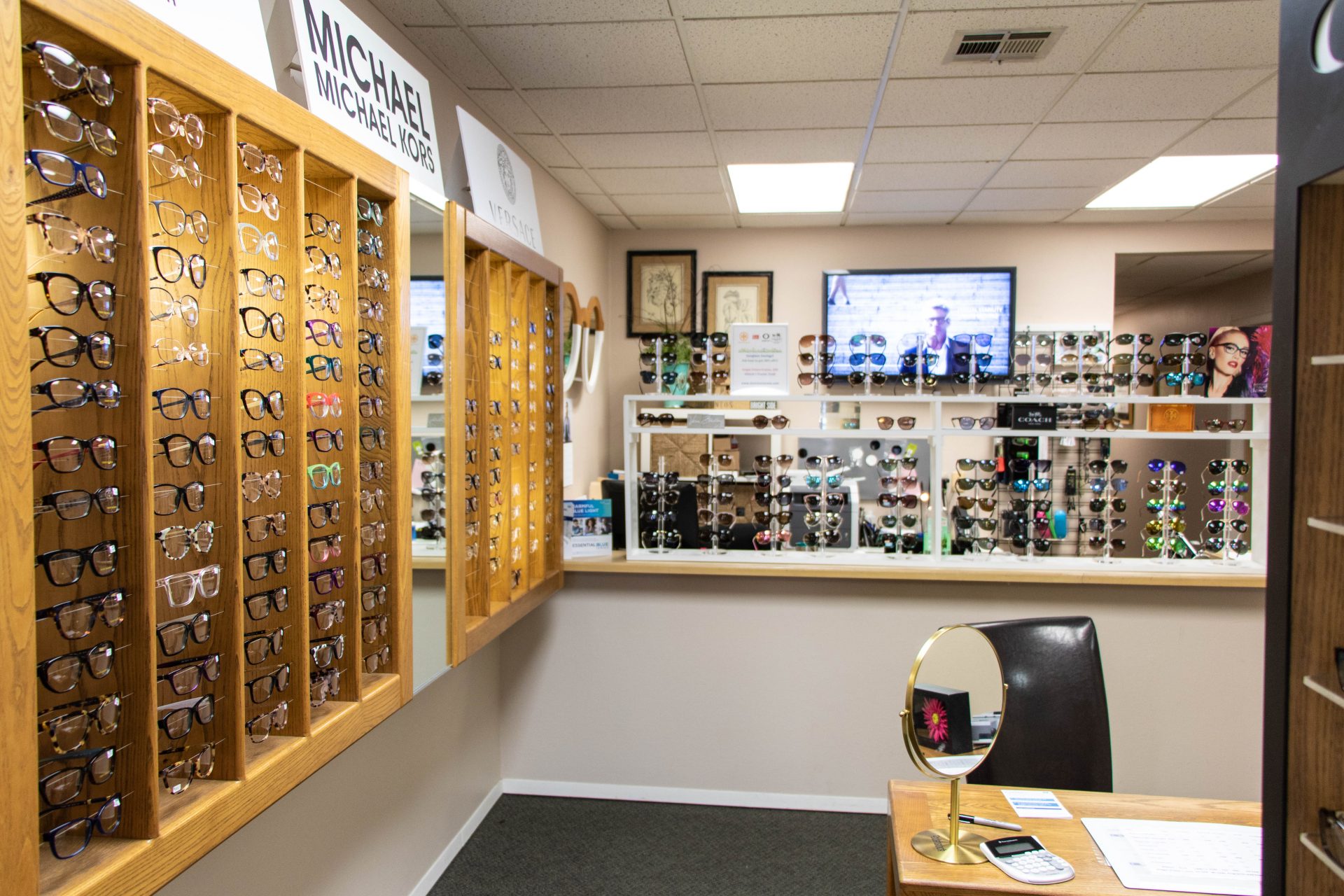
An optometry office in Duncan, Okla.
Jackie Fortier / StateImpact Oklahoma


An optometry office in Duncan, Okla.
Jackie Fortier / StateImpact Oklahoma

Jackie Fortier / StateImpact Oklahoma
Duncan optometrist Brendhan Fritts in an exam room at this practice.
Brendhan Fritts’ optometry practice in Duncan is filled with brightly colored displays of models in designer glasses, pamphlets on the importance of routine eye care — and posters against State Question 793.
It doesn’t look like a scene for political discussions, but with the November election looming, Fritts is having more and more conversations with his patients.
“‘How do you want me to vote?’ Is basically what they ask me. ‘What do you want me to do?’ And I say, ‘I want you to vote no for these reasons,’” Fritts said.
Fritts has worked as an optometrist for 13 years, the last seven in Duncan. He decided to move back home after practicing in other areas of the country, most recently Dallas. Until now, Fritts’ major competition has been other individual optometrists in the area — but if SQ 793 passes, he estimates he’ll lose 30 percent of his business.
Fritts, along with the Oklahoma Association of Optometric Physicians, is vehemently opposed to State Question 793. The measure would change the state constitution to allow Oklahoma optometrists — health professionals who examine people’s eyes for vision or health problems and can prescribe corrective glasses or contacts — to open clinics in large retail stores like Walmart and Target.
“I tell them [patients] Walmart wrote a very good question,” Fritts said. “If you read the first two paragraphs, [you’ll think] why don’t I check yes, this seems like a no-brainer! But if you get tired, just skip to the last three sentences, and that’s where our issue lies.”
That section allows optometrists to sign a contract with a retailer like Walmart that limits their scope of practice — the procedures and services an optometrist is allowed to perform under their state license.
Right now, Oklahoma optometrists are required to conduct specific tests on all patients to make sure they get a comprehensive eye exam.
If SQ 793 passes, Fritts is concerned that corporations who have agreements with optometrists to operate in their stores will have the power to bar them from doing some of those tests, leading to substandard exams and assembly line eye care.
Jennifer Sommer, director of optical practice compliance for Walmart and Sam’s Club, says that won’t happen in their stores. Under the proposed Walmart business model, optometrists remain independent and rent space from the store. The sales of glasses and contacts are done by Walmart employees, and Sommer says, the store does not profit from the cost of the exam.
“With the very narrow exception of laser eye surgery, we would actually encourage all optometrists to practice to the highest extent of their license,” Sommer said.
Oklahoma’s broad scope of practice for optometrists necessitated the restriction in SQ 793, Sommer said. Optometrists are not medical doctors and in many states aren’t allowed to perform minor eye surgeries — but in Oklahoma, they can.
She describes it as a ‘belts and suspenders approach.’
“We wanted to make sure there’s not an opportunity for legislation that would inhibit our ability to have practices in our stores,” Sommers said. “Especially if that contract had a provision that limited the doctor’s ability to perform major eye surgeries or laser surgeries at that location.”
The main political action committee urging a ‘yes’ vote on SQ 793 has raised about $100,000, with more than half of that coming from Walmart, followed by retail support groups and Costco Wholesale.

Jackie Fortier / StateImpact Oklahoma
One of many posters against SQ 793 in Fritts’ office. He estimates he’ll lose 30 percent of his business if the measure passes.
Meanwhile, a committee pushing ‘no’ votes on the state question has raised about $1.4 million with big checks from the Oklahoma Association of Optometric Physicians and scores of donations from individual optometrists across the state.
Sam Greco, a health care consultant, says that may sound like a lot, but they are fighting for a piece of the nation’s $18 billion eye care industry.
“If they can create either the real or perceived view of affordability then they have achieved two of the goals of healthcare consumers: access and affordability,” Greco said.
Medicare Advantage plans are becoming popular due to their low monthly costs as cash-strapped baby boomers get older. These plans contract with the federal government to provide extra benefits to seniors than traditional Medicare. Some of the Advantage plans include routine vision insurance. Capturing those dollars, Greco says, and leveraging the need for in-person eye exams helps Walmart compete with Amazon.
“We don’t have any problem with Walmart having optometrists doing eye exams, the problem is being in the state constitution, and changing the scope of practice,” Fritts said.
Walmart and Sam’s Club have about 3,300 vision centers across the U.S. Voters will decide this November if Oklahomans will see any in their state.